Tai Chi offers impressive benefits for your aging heart. It greatly improves cardiovascular function, reducing blood pressure by up to 7 mmHg and increasing arterial compliance by 40-44% compared to non-practitioners. You’ll enjoy enhanced heart function, better exercise capacity, and reduced risk of heart disease. The gentle movements simultaneously improve your balance and mobility while reducing stress—a powerful cardiovascular risk factor. Discover how this ancient practice provides a thorough approach to heart health.
The Gentle Path to Stronger Cardiovascular Function
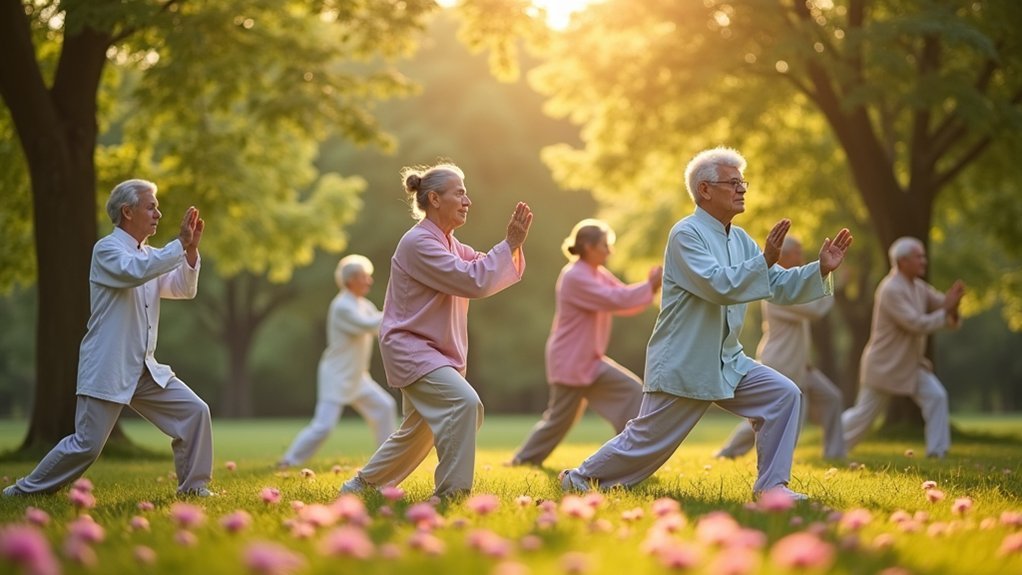
As we age, our cardiovascular health naturally declines, but Tai Chi offers a gentle yet powerful alternative to traditional exercise for older adults. Research shows it considerably increases your cardiac index and improves overall heart function.
You’ll experience enhanced exercise capacity, even if you’re living with chronic heart failure. The slow, deliberate movements of Tai Chi improve your lung function, essential capacity, and maximal oxygen uptake—all crucial components of cardiopulmonary health.
What’s particularly valuable is Tai Chi’s ability to reduce the incidence of cardiovascular and cerebrovascular disease. It improves both large and small artery compliance, supporting better vascular health. Studies reveal that elderly Tai Chi practitioners demonstrate 40-44% higher arterial compliance compared to non-practitioners of similar age.
For your heart, this means less stress and more efficient function, creating a foundation for better quality of life as you age.
How Tai Chi Improves Blood Pressure and Arterial Health
When it comes to heart health, blood pressure management stands at the forefront of cardiovascular care, and Tai Chi offers remarkable benefits in this area.
Research suggests Tai Chi may actually outperform aerobic exercise for those with prehypertension, reducing systolic blood pressure by an average of 7.01 mmHg over a year. A recent JAMA Network Open study found more participants in the tai chi group achieved normal blood pressure readings compared to those doing aerobic exercise.
The gentle practice works through multiple pathways to improve your cardiovascular system:
- Increases arterial compliance by up to 44%, enhancing vascular flexibility
- Promotes vasodilation by boosting nitric oxide levels
- Reduces fight-or-flight response while activating relaxation mechanisms
- Strengthens muscles without compromising arterial health, unlike some forms of strength training
For best results, aim for at least 16 weeks of regular practice.
Balancing Heart Benefits With Mobility Improvements
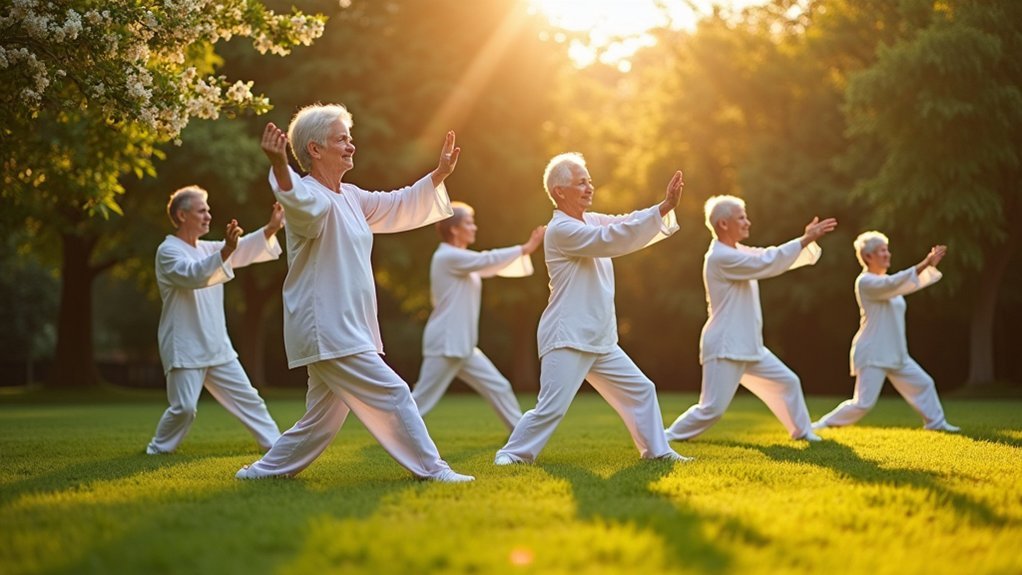
The perfect complement to cardiovascular wellness, Tai Chi delivers a dual benefit by enhancing mobility while strengthening your heart. This ancient practice improves your balance and reduces fall risk—crucial factors as you age—while simultaneously boosting cardiac function through gentle, flowing movements.
You’ll notice improved flexibility, muscle strength, and posture with regular practice, all while your heart enjoys enhanced oxygen uptake and essential capacity.
For those with arthritis or chronic pain, Tai Chi offers relief that makes daily movement easier and more comfortable. Regular practice of Tai Chi can significantly reduce chronic pain symptoms associated with conditions like arthritis and osteoporosis.
Even if you’re dealing with mobility limitations, you can adapt Tai Chi to your needs—many exercises can be performed seated.
Stress Reduction: The Mind-Heart Connection in Tai Chi
Stress silently taxes your heart, creating a hidden burden that Tai Chi can effectively eliminate. This ancient practice uniquely bridges the mind-body gap, activating your relaxation response through its deliberate movements and focused breathing.
When you practice Tai Chi regularly, you’ll experience:
- Reduced neuroinflammation that contributes to stress and mood disorders
- Enhanced emotional well-being with measurable decreases in sadness and increases in happiness
- Deep diaphragmatic breathing that alleviates strain on your nervous system
- A meditative “flow state” where distractions fade and calm prevails
For your aging heart, this stress reduction translates directly into physical benefits. As your body relaxes through Tai Chi’s mindful movements, your blood pressure naturally lowers and cardiovascular function improves—without the strain of high-impact exercise. Research has demonstrated that practicing Tai Chi results in significant decreases in blood pressure across numerous clinical studies.
Adapting Tai Chi Practices for Various Health Conditions
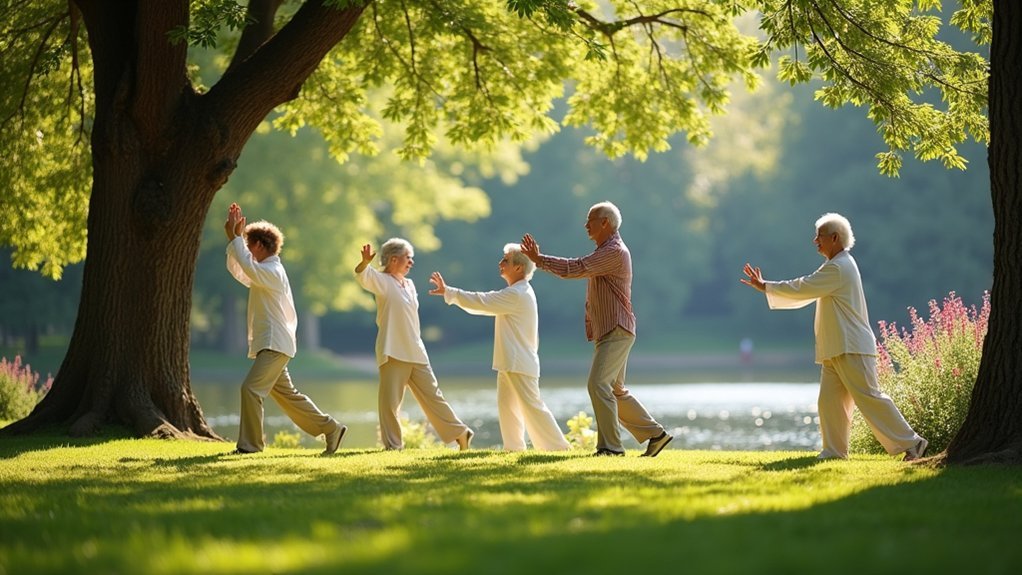
One of Tai Chi’s most powerful attributes is its adaptability to different health needs and limitations. If you’re living with heart failure, you’ll find it can reduce psychological distress while enhancing your mental health quality of life.
For those managing fibromyalgia, Tai Chi offers relief through pain reduction and improved sleep quality.
Breast cancer survivors often experience enhanced well-being, while COPD patients see improvements in lung function and exercise capacity beyond what other gentle exercises provide. The practice creates an environment of mental engagement by having participants focus on evocative descriptions during movements.
Tai Chi offers uniquely powerful benefits for both breast cancer survivors and COPD patients seeking improved quality of life.
You don’t need to worry if you have mobility issues—Tai Chi can be modified to accommodate physical limitations.
It’s increasingly incorporated into rehabilitation programs for heart conditions, and you’ll find classes at community centers, hospitals, and assisted living facilities.
You can even practice at home using instructional videos.
Frequently Asked Questions
How Long Does It Take to See Cardiovascular Benefits From Tai Chi?
You’ll typically notice cardiovascular benefits from tai chi after three months of consistent practice, though some improvements in blood pressure and heart rate can appear within a few weeks if you’re practicing regularly.
Can Tai Chi Replace Medication for Heart Conditions?
No, tai chi can’t replace medication for heart conditions. You should use it as a complementary therapy alongside traditional treatments. It offers benefits without side effects, but there’s no conclusive evidence it can substitute prescribed medications.
Are There Specific Tai Chi Styles Better for Heart Health?
Yang’s style is well-documented for heart health benefits, though limited research directly compares styles. You’ll find tailored programs specifically designed for cardiovascular health. Consider your physical limitations when choosing a style that works for you.
How Does Tai Chi Compare to Other Exercises for Seniors’ Hearts?
Tai Chi offers unique heart benefits compared to other exercises. You’ll find it’s gentler on joints than running, more effective for lowering blood pressure than intense aerobics, and combines physical movement with stress-reducing meditation.
Is Tai Chi Safe After a Heart Attack or Cardiac Surgery?
Yes, tai chi is generally safe after heart attacks or cardiac surgery. You’ll benefit from its low intensity, stress reduction, and cardiovascular improvements. Always consult your doctor before starting any exercise program post-cardiac event.
In Summary
You’ll find that tai chi offers your aging heart remarkable benefits. You’re strengthening cardiovascular function while improving blood pressure and arterial health through gentle, accessible movements. You’re also reducing stress that impacts heart function. Whether you’re dealing with existing health conditions or simply seeking preventive care, you can adapt tai chi to fit your needs, creating a balanced approach that nurtures both your heart and mobility.

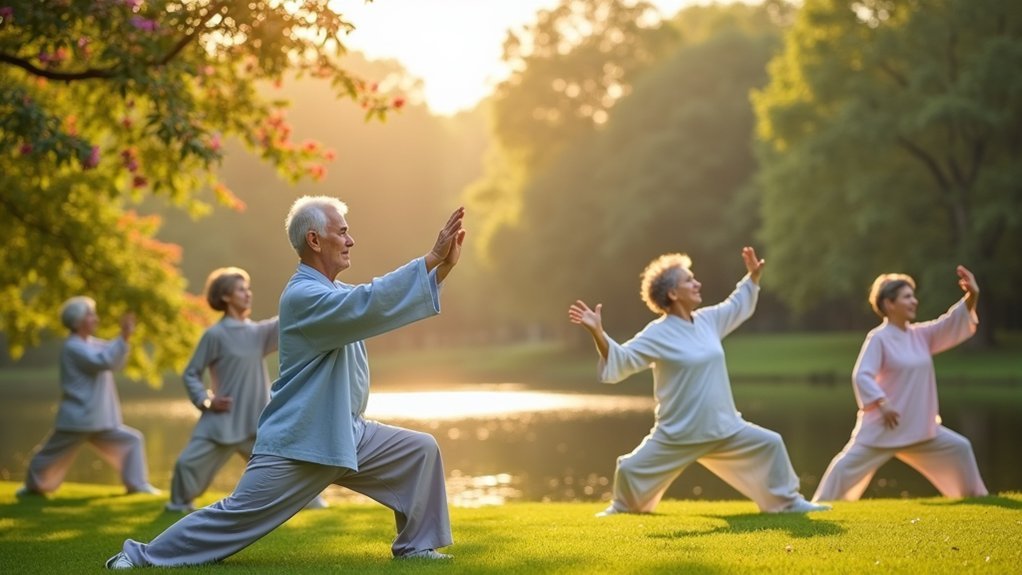

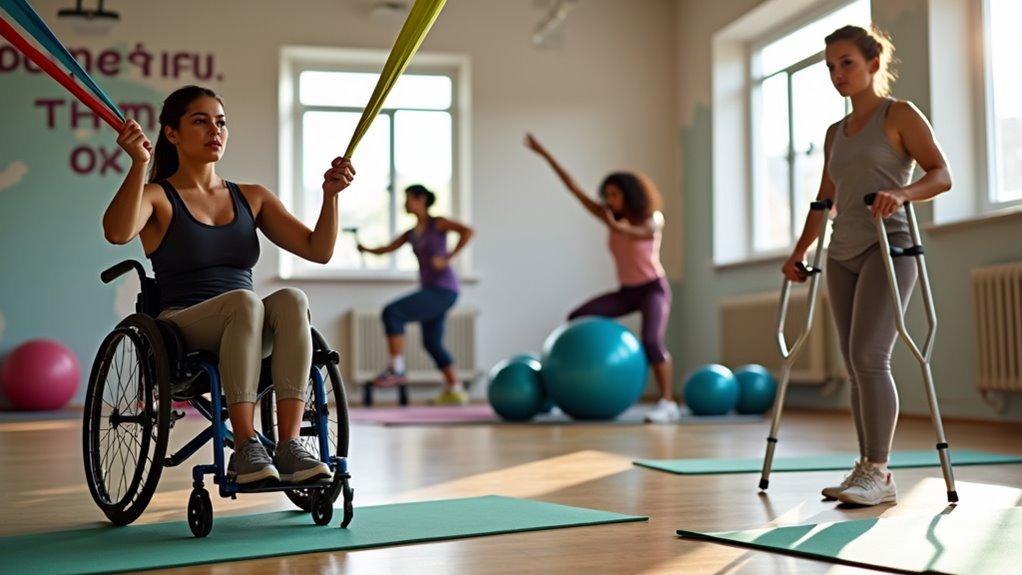
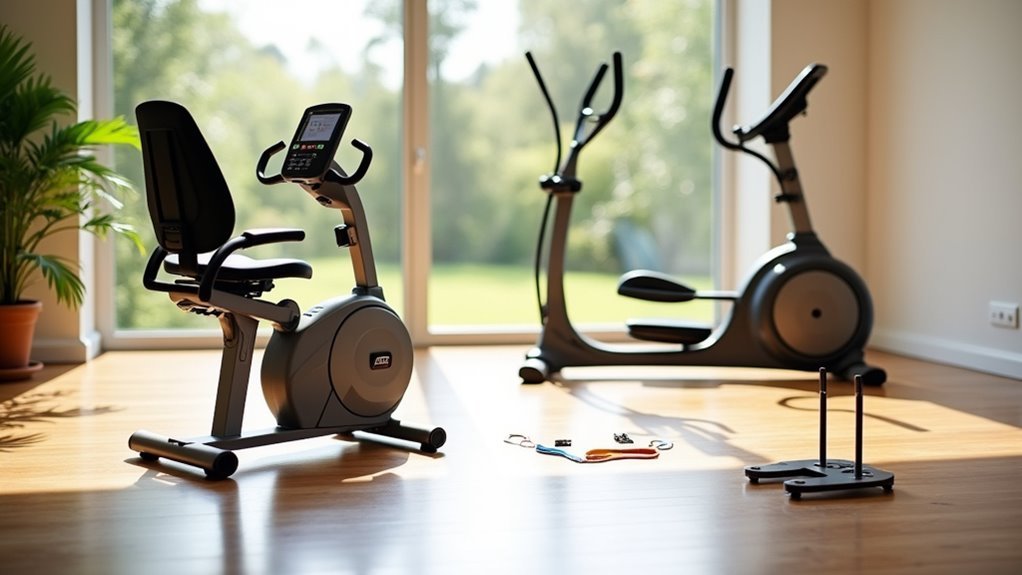
Leave a Reply